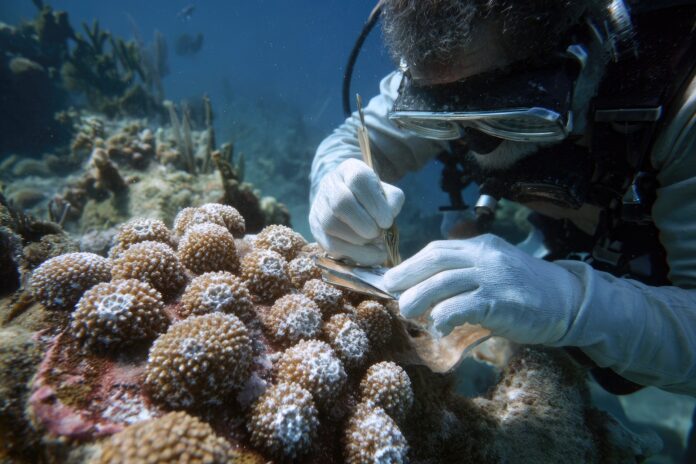A New Hope for Reef Survival
Probiotics helped great star corals fend off a deadly disease—offering a turning point in the battle to restore devastated reefs. In recent years, coral reefs across the Caribbean and Florida have faced a relentless threat: stony coral tissue loss disease (SCTLD). This mysterious and aggressive disease has left marine biologists and conservationists searching for sustainable solutions as antibiotics fall short due to resistance and reinfection risks [1].
Understanding Stony Coral Tissue Loss Disease (SCTLD)
SCTLD is one of the most devastating coral diseases on record. First detected in Florida in 2014, it quickly spread to the Florida Keys and then across the Caribbean. It is confirmed in at least 20 countries and affects more than 30 species of stony corals, including iconic great star corals (Montastraea cavernosa) [4]. The disease manifests as rapid tissue loss—white bands where living polyps disappear, revealing bare skeleton. Within weeks to months, entire coral colonies can perish [1].
Limitations of Traditional Treatments
Traditional responses to SCTLD have relied on antibiotics such as amoxicillin. While these treatments can temporarily halt tissue loss, they must be repeatedly applied. Most importantly, antibiotics do not prevent reinfection and pose the danger of fostering resistant pathogens. As Valerie Paul, head scientist at the Smithsonian Marine Station, points out: “Antibiotics do not stop future outbreaks. The disease can quickly come back, even on the same coral colonies that have been treated” [4].
The Promise of Probiotics
Driven by the need for a more sustainable solution, researchers at the Smithsonian Marine Station began exploring the potential of probiotics—beneficial bacteria that can suppress or outcompete disease-causing organisms. In 2018, they identified a particularly promising strain: McH1-7 [5]. By late 2020, 30 infected great star coral colonies were treated with this probiotic.
Breakthrough Results in the Field
The results were striking. When researchers applied a probiotic paste containing McH1-7 directly onto diseased coral inside protective bags, the spread of SCTLD slowed dramatically or stopped in all eight treated colonies. On average, tissue damage was limited to just 7 percent, compared to 30 percent in colonies left untreated [1]. While the paste applied without bagging showed less effect, the experiment marks a real advance in disease management for wild corals [2].
How Do Probiotics Work on Corals?
Probiotics benefit corals in multiple ways. They may attack or outcompete the pathogenic bacteria behind SCTLD, or even stimulate the coral’s immune system to defend itself more effectively [1]. Because the root cause of SCTLD remains uncertain, this multifaceted action makes probiotics especially valuable.
Why Probiotics Offer a Sustainable Solution
Unlike antibiotics, probiotics do not promote resistance in pathogens. Moreover, they offer protection beyond the initial application, deterring reinfection and supporting the coral’s existing microbiome. This approach represents a shift toward holistic reef care, acknowledging the importance of microbial diversity for a resilient reef ecosystem [3].
Challenges and Next Steps
Despite promising results, probiotic treatment for SCTLD is still experimental. Researchers caution that these findings are proof-of-concept, not a definitive cure. Field trials must be scaled up, and scientists must pinpoint the cause of SCTLD to refine targeted therapies [2].
Nevertheless, the use of probiotics marks a pivotal advance in coral conservation. As reef restoration becomes ever more urgent, these innovative microbial treatments could help tip the balance in favor of coral survival.
Further Reading and Sources
- Science News: Probiotics helped great star corals fend off a deadly disease
- Popular Science: Probiotics can help heal ravaged coral reefs
- Smithsonian Magazine: Could Probiotics Be the Solution?
- Smithsonian Marine Station: Bacterial compound shows promise



